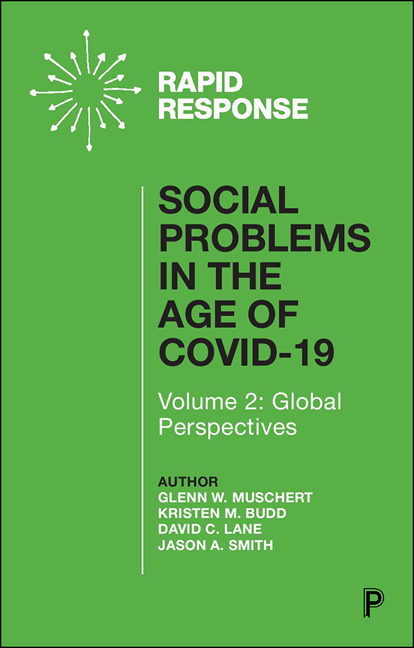Book contents
- Frontmatter
- Contents
- Acknowledgments
- Presidential Welcome
- Editorial Introduction
- 1 Isolation, Economic Desperation, and Exploitation: Human Trafficking and the COVID-19 Crisis
- 2 Uncertainty and Disruption in the Transition to Adulthood During COVID-19
- 3 Disability Rights and Healthcare Rationing during COVID-19
- 4 Social-Distancing the Settler-State: Indigenous Peoples in the Age of COVID-19
- 5 The Pandemic and the Invisible Poor of the Global South: Slum Dwellers in Mumbai, India and Dhaka, Bangladesh
- 6 The Human Right to Water and Sanitation in the Age of COVID-19
- 7 Pandemic Perils of Migrant Workers: Inequalities Intensified
- 8 Food Insecurity and COVID-19
- 9 Protecting Refugee Health and Human Rights in the Context of the COVID-19 Pandemic: Challenges and Pathways to Justice
- 10 COVID-19 Requires an Intersectional Feminist Policy Response
- End Matter
- Afterword
- Index
11 - Think Piece: On Values, Security, and Wellbeing Under the COVID-19 Pandemic in 2020
Published online by Cambridge University Press: 23 March 2021
- Frontmatter
- Contents
- Acknowledgments
- Presidential Welcome
- Editorial Introduction
- 1 Isolation, Economic Desperation, and Exploitation: Human Trafficking and the COVID-19 Crisis
- 2 Uncertainty and Disruption in the Transition to Adulthood During COVID-19
- 3 Disability Rights and Healthcare Rationing during COVID-19
- 4 Social-Distancing the Settler-State: Indigenous Peoples in the Age of COVID-19
- 5 The Pandemic and the Invisible Poor of the Global South: Slum Dwellers in Mumbai, India and Dhaka, Bangladesh
- 6 The Human Right to Water and Sanitation in the Age of COVID-19
- 7 Pandemic Perils of Migrant Workers: Inequalities Intensified
- 8 Food Insecurity and COVID-19
- 9 Protecting Refugee Health and Human Rights in the Context of the COVID-19 Pandemic: Challenges and Pathways to Justice
- 10 COVID-19 Requires an Intersectional Feminist Policy Response
- End Matter
- Afterword
- Index
Summary
Evolution of Values and Society in Crisis
The COVID-19 pandemic turned into a global scale social crisis upending many spheres of society across the world: families’ income, health, education, social life, and wellbeing. Billions of people in many countries faced severe restrictions in their daily lives while threatened by the virus and its unpalatable consequences. According to the recent Human Development Report, the COVID-19 pandemic is also unleashing a steep and unprecedented decline in human development. There are many more less visible indirect effects, including increased home violence, youth unemployment, marriage delays, reproductive postponement, etc.
To fight COVID-19, governments in many countries introduced unprecedented limitations of people's mobility and announced the state of emergency. These dramatic disruptions led to the global economic crisis that urgently needs to be addressed. Countries’ leaders took exceptional actions such as enormous aid packages to families and businesses as well as healthcare systems to support their population and economies.
This volume tackles many important global issues of the COVID-19 crisis, including human trafficking, secure access to clean water, food security, transition to adulthood, labor migration crisis, poverty, disability, and gender issues. This think piece is grounded on those ideas and further develops a discussion based on human values in critical situation under cross-national perspective.
Surprisingly, societies with different cultural backgrounds and different levels of economic development reacted to the COVID-19 in a similar way: first by rejection of the threat of the dangerous virus by the public and by governments; then with slow interventions of government measures to ban social gatherings and set up policies for social distancing; and followed by generational differences in attitudes to comply with the mask regimes and lockdown regulations. These similar patterns of social behavior in different societies could be explained by the cultural evolution or evolutionary modernization theory of Ronald Inglehart.
The theory explains that a global intergenerational value change from materialist to postmaterialist values, or from survival to self-expression values, occurred slowly in many developed societies since World War II. The world has experienced its longest peace period of more than 70 years, during which several generation changes happened. Societal values cannot change fast, usually it takes one or two generations to witness those changes.
- Type
- Chapter
- Information
- Social Problems in the Age of COVID-19 Vol 2Volume 2: Global Perspectives, pp. 123 - 132Publisher: Bristol University PressPrint publication year: 2020

